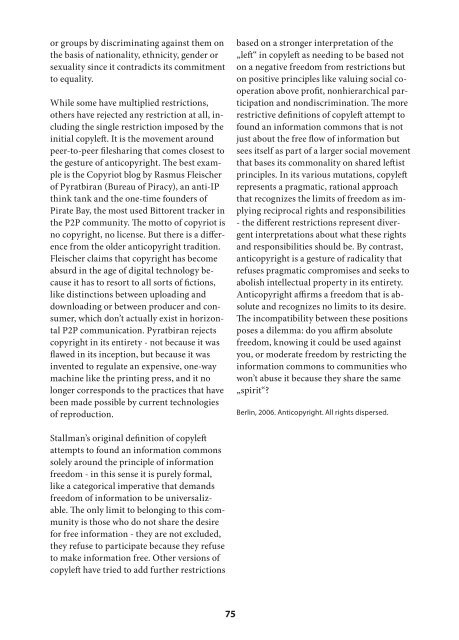You also want an ePaper? Increase the reach of your titles
YUMPU automatically turns print PDFs into web optimized ePapers that Google loves.
or groups by discriminating against them on<br />
the basis of nationality, ethnicity, gender or<br />
sexuality since it contradicts its commitment<br />
to equality.<br />
While some have multiplied restrictions,<br />
others have rejected any restriction at all, including<br />
the single restriction imposed by the<br />
initial copyleft. It is the movement around<br />
peer-to-peer filesharing that comes closest to<br />
the gesture of anticopyright. The best example<br />
is the Copyriot blog by Rasmus Fleischer<br />
of Pyratbiran (Bureau of Piracy), an anti-IP<br />
think tank and the one-time founders of<br />
Pirate Bay, the most used Bittorent tracker in<br />
the P2P community. The motto of copyriot is<br />
no copyright, no license. But there is a difference<br />
from the older anticopyright tradition.<br />
Fleischer claims that copyright has become<br />
absurd in the age of digital technology because<br />
it has to resort to all sorts of fictions,<br />
like distinctions between uploading and<br />
downloading or between producer and consumer,<br />
which don’t actually exist in horizontal<br />
P2P communication. Pyratbiran rejects<br />
copyright in its entirety - not because it was<br />
flawed in its inception, but because it was<br />
invented to regulate an expensive, one-way<br />
machine like the printing press, and it no<br />
longer corresponds to the practices that have<br />
been made possible by current technologies<br />
of reproduction.<br />
Stallman’s original definition of copyleft<br />
attempts to found an information commons<br />
solely around the principle of information<br />
freedom - in this sense it is purely formal,<br />
like a categorical imperative that demands<br />
freedom of information to be universalizable.<br />
The only limit to belonging to this community<br />
is those who do not share the desire<br />
for free information - they are not excluded,<br />
they refuse to participate because they refuse<br />
to make information free. Other versions of<br />
copyleft have tried to add further restrictions<br />
75<br />
based on a stronger interpretation of the<br />
„left“ in copyleft as needing to be based not<br />
on a negative freedom from restrictions but<br />
on positive principles like valuing social cooperation<br />
above profit, nonhierarchical participation<br />
and nondiscrimination. The more<br />
restrictive definitions of copyleft attempt to<br />
found an information commons that is not<br />
just about the free flow of information but<br />
sees itself as part of a larger social movement<br />
that bases its commonality on shared leftist<br />
principles. In its various mutations, copyleft<br />
represents a pragmatic, rational approach<br />
that recognizes the limits of freedom as implying<br />
reciprocal rights and responsibilities<br />
- the different restrictions represent divergent<br />
interpretations about what these rights<br />
and responsibilities should be. By contrast,<br />
anticopyright is a gesture of radicality that<br />
refuses pragmatic compromises and seeks to<br />
abolish intellectual property in its entirety.<br />
Anticopyright affirms a freedom that is absolute<br />
and recognizes no limits to its desire.<br />
The incompatibility between these positions<br />
poses a dilemma: do you affirm absolute<br />
freedom, knowing it could be used against<br />
you, or moderate freedom by restricting the<br />
information commons to communities who<br />
won’t abuse it because they share the same<br />
„spirit“?<br />
Berlin, 2006. Anticopyright. All rights dispersed.


